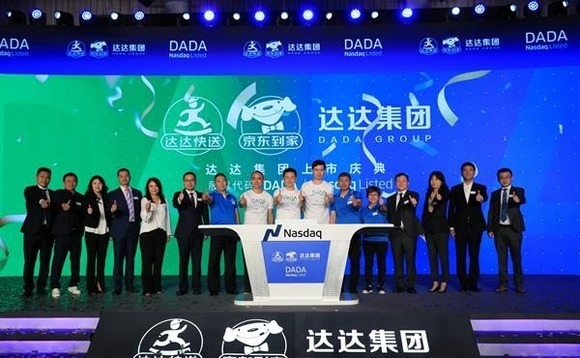
China's Dada Nexus trades flat after $322m US IPO

Dada Nexus, a Chinese last-mile delivery platform backed by the likes of JD.com, Walmart, Sequoia Capital China, and DST Global, traded flat on its NASDAQ debut following a $320 million IPO.
The company sold 20 million American Depository Shares (ADS) for $16.00 apiece, the midpoint in the indicative range, according to a statement. It initially planned to sell 16.5 million ADS. Members of the Dada Nexus management team participated in a virtual bell-ringing ceremony from Shanghai that was broadcast in New York's Times Square. The stock opened at $16.29 on June 5 and closed at $15.99.
JD.com and Walmart expressed interest in contributing $60 million and $30 million, respectively, to the offering. Dada Nexus has yet to confirm whether the two investors purchased additional shares. Following the IPO, JD.com was expected to be diluted to 47.5% and Walmart to 10%. Sequoia, and DST would own 10.5% and 8.7%.
Dada Nexus operates under two brands, Dada Now and JDDJ, which it claims are the market leaders in local on-demand delivery and supermarket delivery, respectively. In the 12 months ended March, it dispatched 634,000 active riders to fulfill 822 million orders. Intra-city delivery services cover 700 cities in China, while the last-mile delivery service is available in more than 2,400 cities.
Dada Nexus was established in 2014 as a last-mile delivery services provider operating through a crowdsourcing model. It gained traction in food delivery, sourcing orders through partnerships with Ele.me and Meituan-Dianping. The company raised a Series A round from Sequoia the year of its founding and then a Series B from undisclosed investors. Two more funding rounds closed in 2015: a $100 million Series C round led by DST, and a $300 million Series D round co-led by DST and Sequoia.
In 2016, Dada Nexus merged with JD Daojia (JDDJ), the online-to-offline (O2O) business unit of JD.com. JD.com injected its existing O2O resources and $200 million in cash into the combined entity, taking a 47.4% stake. JD Daojia was launched in 2015, offering two-hour delivery of products from local supermarkets through its location-based app. Walmart invested in the merged entity in 2016 and then participated in a $500 million funding round alongside JD.com in 2018.
Walmart had already integrated its China inventory management platform with JD.com as part of a strategic alignment. When customers placed orders on JD.com, the system determined whether a JD.com warehouse or a Walmart store was closer to the delivery destination. JDDJ now works with leading supermarket chains such as Walmart, Yonghui Superstores, and CR Vanguard. In the 12 months ended March, the platform handled 134.7 million orders from 27.6 million users worth RMB15.7 billion ($2.2 billion) in gross merchandise value (GMV).
The Dada Nexus system is underpinned by a smart order recommendation and dispatching platform that bundles orders in advance and suggests best routes to riders, an automated pricing mechanism, and a mechanism for tracking, rating and managing riders. Retailers using JDDJ have access to online omnichannel retail systems that cover customer relationship management (CRM) and inventory management as well as customized fulfillment services.
Dada Nexus generated revenue of RMB3.1 billion in 2019, up from RMB1.9 billion the previous year. Over the same period, its net loss narrowed slightly from RMB1.9 billion to RMB1.7 billion. For the three months ended March, revenue came to RMB1 billion and the net loss was RMB279.3 million.
According to iResearch Consulting, China's on-demand delivery and courier services market will handle 161.5 million average daily orders by 2023, representing compound annual growth of 18.1% from 2019. On-demand delivery services provided by independent platforms will account for 27.7 million orders. GMV generated by local on-demand retail within the supermarket segment is projected to reach RMB385.4 billion by 2023, representing compound annual growth of 69.5% from 2019.
Latest News
Asian GPs slow implementation of ESG policies - survey
Asia-based private equity firms are assigning more dedicated resources to environment, social, and governance (ESG) programmes, but policy changes have slowed in the past 12 months, in part due to concerns raised internally and by LPs, according to a...
Singapore fintech start-up LXA gets $10m seed round
New Enterprise Associates (NEA) has led a USD 10m seed round for Singapore’s LXA, a financial technology start-up launched by a former Asia senior executive at The Blackstone Group.
India's InCred announces $60m round, claims unicorn status
Indian non-bank lender InCred Financial Services said it has received INR 5bn (USD 60m) at a valuation of at least USD 1bn from unnamed investors including “a global private equity fund.”
Insight leads $50m round for Australia's Roller
Insight Partners has led a USD 50m round for Australia’s Roller, a venue management software provider specializing in family fun parks.








